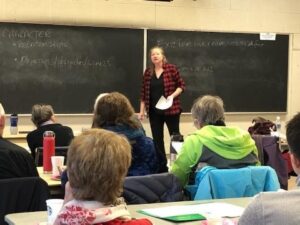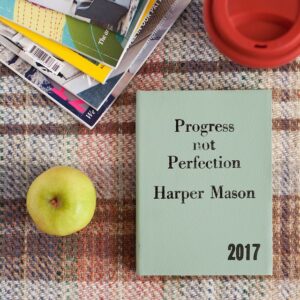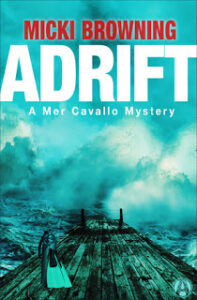Five Thoughts on Writing

I have a lot of thoughts on writing. But that doesn’t mean I’m always conscious of my own process. Sometimes the best thing I can do to get motivated with my own writing is to teach other people writing techniques.
EPIC Group Writers in Edmonds, Washington, recently hosted one of my workshops on the rewriting process.
It was a blast.
The participants were smart and engaged, with terrific questions and showed a total immersion for all four hours of the workshop.
I love the rewriting process: I love to do it, talk about it, and think about it.
But I’ve been a bit slow to get the first draft of my next novel done, which means . . . no rewriting for Elena!
Getting the group energized about rewriting, I was reminded how much the concepts for rewriting were applicable to finishing a first draft (physician heal thyself!)
Here are a couple of the thoughts on (re)writing I focused on for the workshop.
-
-
- There’s no such thing as a perfect book.
- “Story” and “plot” are two different things.
- Characters have one fundamental external and one fundamental internal goal.
- Every single character has objectives, obstacles, and stakes.
- The point of the first draft is just to get the “story” down on the page, the “plot” can be honed later.
-
Let’s take a closer look at my thoughts on writing.
Thought One on Writing
There’s no such thing as a perfect book.

The idea of perfection gets in the way for a lot of writers. There’s this sense that if something isn’t “perfect” the writer can’t move forward.
That a rewrite can’t be finished unless everything is “perfect.” I’m happy to say that I don’t fall into that trap . . . MOST of the time.
Here’s why I say it’s a trap.
“Perfect” is subjective. What’s perfect to one person isn’t to another, so it’s not something that can be attained.
Secondly, and more importantly in this instance, nothing is ever perfect with a first attempt.
The idea that a draft will be “perfect” isn’t useful. What’s far more useful is “what can I fix?” or, if the draft is still in progress, “what am I missing?”
While I don’t try to be perfect, I can get caught up with the thought, “this scene isn’t going to be a good scene, so I shouldn’t write it.”
Then it’s time to remind myself, it doesn’t matter if a scene isn’t a good scene, or whether or not it will end up in the final draft, I just need to get the bulk of the “story” on the page so I can start to shape it.
Thought Two on Writing
Story and plot are two different things
Story is everything involved in making up the novel. The backstory or background about the characters, all the events that take place off the page, where the characters might be headed after the novel is over. EVERYTHING.
The plot is made up of only the specific events that are actually on the page.
It’s useful to remember that I’m just sorting out the story with a first draft. It doesn’t matter what’s extraneous, or missing, just get it all out there.
Thought Three on Writing
Characters have one fundamental external and one fundamental internal goal.
This is a really useful tool for me. It allows me to understand what’s driving each character through the story.
For a murder mystery, the external goal for the protagonist can be pretty obvious, solve the murder and catch the killer, but the internal goal can be tricky to identify. It dawned on me I know the external goal in my latest work, but not the internal goal.
If I knew that, I could see the internal motivations, how they interact with the external motivations, and have a better understanding of how my character will act and react.
This gives me a clear goal: Discover my protagonist’s internal goal for THIS STORY. Not every story, just the one in this book.
Thought Four on Writing
Every single character has objectives, obstacles, and stakes
Similar to the previous point about goals, but on a smaller scale. For every scene, each character has an objective, something is in the way, and there’s a cost to not achieving that goal (and potentially a cost at achieving it as well).
I’m reminded that every place I’ve stopped moving forward in the draft, if I go back and look at what my characters are after, and see what’s in the way, I have a sense of what they will do in that moment to achieve their goals. Then, once they get them, what they will do next to achieve the larger external/internal goal that drives the entire story.
By locating the places where the story stops (I write scenes out of order) I can identify what the character is going to do next and write forward.
Thought Five on Writing
The point of the first draft is just to get the “story” down, the “plot” can come later.
This point is so important, I’m going to reiterate it here. I have to work through the first draft before I can get to the fun part of rewriting. So if my external goal is to finish the next novel and my internal goal is to write a better book than I wrote last time, I have to achieve the short-term goal of writing a first draft.
There aren’t any real obstacles in my way, it’s just putting my butt in the seat and my fingers on the keyboard.

I can do that. We can all do that. One step at a time to reach any goal we’ve set for ourselves.
I’ve got some time carved out next week to reinvigorate my writing process. Check back in and I’ll let you know how it’s going.
Looking for more motivations to keep writing? Read my blog post on motivations for writing in winter by clicking the link here.
Remember – we’re all in this together. I’d love to know what YOU’RE working on and how you stay motivated!
Workshop photo by Mindy Halleck: Click the link here to learn more about her.
Progress not Perfection photo by StockSnap on Pixabay. Click the link here for more information.
Goal image by Tumisu on Pixabay. Click the link here for more information.
Footstep image by Free-Photos on Pixabay. Click the link here for more information.




Good food for thought—I’m in revisions and could use the reminder about the difference between story and plot, not to mention thinking about internal motivations. Ironically, I just wrote a post on editing—and yours makes me realize that I’ve been focused on the process and maybe not enough on the point of it all.
I’m so glad it felt useful! I’d love for you to put a link to your post on editing in the comments – that would be a really useful resource for me and my readers.